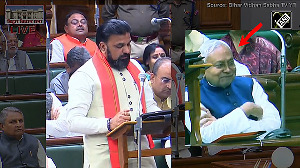The sharp depreciation in the value of the rupee against the US dollar has largely offset, and in certain cases negated, the impact of recent fiscal steps taken by the government on export of commodities such as iron ore and basmati rice. Most of these measures were aimed at containing inflation, currently at 12.14 per cent.
An export duty of Rs 8,000 a tonne was imposed on basmati exports on April 29. However, depreciation in the value of the rupee by over 13 per cent since then has more than compensated the exporters of basmati rice for the export duty.
Basmati exporters have been entering contracts at prices ranging between $1,500 and $1,800 a tonne this year. In rupee terms, the realisation has jumped from the Rs 60,720-72,864 levels to Rs 69,000-82,800 a tonne since the export duty was announced.
The Rs 9,000-10,000 increase in realisation due to the decline in the value of the rupee against the dollar has negated the impact of the duty. While no fresh contracts are being entered into at the moment, exporters say the impact of the depreciation of the rupee will be positive when they enter into new contracts from November.
Similarly, the 15 per cent ad valorem duty on iron ore exports (announced on June 13) to discourage the export of the commodity and augment domestic availability, has been largely offset by the fall of the rupee. The currency has depreciated by over 7 per cent since the new duty was announced, helping exporters by absorbing almost half the impact.
Prior to this duty, iron ore with less than 62 per cent ferrous content attracted a duty of Rs 50 a tonne while those with a higher ferrous content attracted a duty of Rs 300 a tonne. The same day, the government had also levied a 15 per cent export duty on long steel products. The step was aimed at containing inflation, which had then touched a seven-year high of 8.75 per cent due to higher prices of steel, edible oil and cereals.
All the three categories (steel, edible oil and cereals) of exporters have been lobbying strongly with the government ever since the duties were imposed or hiked.
However, steel producers and iron ore miners were not relieved as their export margins have dropped ever since the demand from China slowed after the Olympics, they claimed. "The depreciation of the rupee is not a relief since there has been a sharp correction in international steel prices," said Jayant Acharya, president (sales and marketing), JSW, India's third largest steel producer.







 © 2025
© 2025